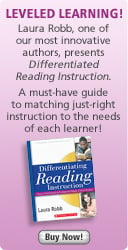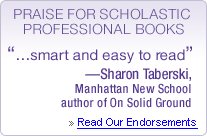|
|


How to Order:
- Buy in The Teacher Store
- Shop for eBooks on Teacher Express
- Fax a PDF/Order
Form - Find Your Book Distributor
- Find Your US Sales Executive
- Find Your
International Sales Rep - Or Call 1-800-SCHOLASTIC
| Coming Soon! |
|
Pre-Order Now! |
Scholastic Professional
Books & More
Books & More
Scholastic Professional offers a robust selection of titles and professional tools that will help you overcome the challenges that you face in the classroom every day. Our publishing list includes an expansive selection of Teaching Strategy books on a variety of topics including Fluency for struggling learners, positive teacher talk, the craft of writing, and strategies for ELL students.
Featured New Releases from Scholastic Professional
 » Buy Now |
Building Independent Readers: A Systematic Approach Mary Haymond; Linda Lee Grades 1 - 3 Two seasoned teachers share their classroom-tested lessons and strategies that build young readers’ stamina so they can read independently for up to 50 minutes, giving them the extensive reading practice all budding readers need. Linda Lee and Mary Haymond take you step-by-step through the process, from creating community of readers and demonstrating book selection strategies to teaching fix-up mini-lessons so children know what to do when they get stuck and fostering whole-group sharing and discussion to ensure accountability. |
 » Buy Now |
It's Not Complicated! What I Know for Sure About Helping Our Students of Color Become Successful Readers Phyllis Hunter Grades PreK - 12 The book showcases renowned educator Phyllis Hunter’s pivotal guidance for administrators, teachers, parents, and concerned citizens about how best to serve the literacy needs of students of color. Hunter addresses twelve pivotal understandings and practices that encourage successful reading—from reading comprehension to Response to Intervention to oral language development and family involvement—that every educator who works with a diverse student population should understand. |
 » Buy Now |
Phonics & Fluency Practice With Poetry Timothy V. Rasinski; William Dee Nichols; William H. Rupley Grades K - 5 Fluency expert Tim Rasinski and his colleagues share a teacher-friendly guide to designing powerful—and fun—fluency practice. Innovative ideas for performing poetry motivate students to read and reread poems, building their word recognition, fluency, and comprehension. |
 » Buy Now |
Check-in Assessments for Differentiated Lessons Troy Strayer; Beverly Strayer Grades 5 & Up These 30 classroom-tested mini-assessments gauge students’ background knowledge at the beginning of a lesson or evaluate what they’ve learned at the end. Highly motivating formats like Alphabet Activator and Incredible Shrinking Summary require little preparation and actively engage students, priming their brains to retain and process key information and ideas. |
 » Buy Now |
Month-by-Month Reading Instruction for the Differentiated Classroom Maria P. Walther; Katherine Phillips Grades K - 2 Veteran teachers Maria Walther and Katherine Phillips share their comprehensive approach to teaching reading in the K-2 classroom. A menu of mini-lessons for the first 25 days of school help teachers establish routines and introduce reading habits and behaviors. A month-by-month chart organizes a year’s worth of mini-lessons in self-monitoring and decoding skills, comprehension strategies, vocabulary development, writing about reading, and genre awareness. |
 » Buy Now |
The ABCs of Emergent Literacy V. Susan Bennett-Armistead; Nell K. Duke; Annie M. Moses; Alison K. Billman; Shenglan Zhang Grades Birth-Pre-K This dynamic video from early literacy expert Nell Duke presents simple strategies that can boost children’s early reading and writing skills when their brains are primed to absorb new language learning! Filmed in exemplary child-care settings, this video gives you a visual tour of environments that enhance young children’s awareness of print and provide rich opportunities to interact with letters and sounds. |
 » Buy Now |
The Next Step in Vocabulary Instruction Karen Bromley Grades 1 - 8 Karen Bromley shares a new approach to vocabulary instruction that nurtures students’ curiosity about language and gives them the knowledge and skills they need to tackle new words independently. Find fresh ideas for teaching word structure, context clues, multiple meaning words, synonyms, antonyms and more. |
 » Buy Now |
Teaching Young Writers to Craft Realistic Fiction Jenny Mechem Bender Grades K - 3 Seasoned writing teacher Jenny Mechem Bender echoes what most primary teachers already know: our young students long to write fiction! And with just enough detailed, step-by-step instructional support—across eight stages of a complete Realistic Fiction Unit of Study together with mentor texts and formative assessment—Bender demonstrates how our youngest writers can craft realistic fiction with meaning, focus, and detail as they consider voice, audience and the power of language. |
View and print items marked (PDF) using Adobe Acrobat Reader® software, version 4.0 or higher. Get Adobe Reader for free.












